牛津英语8A Unit8教案
- 格式:doc
- 大小:103.00 KB
- 文档页数:15
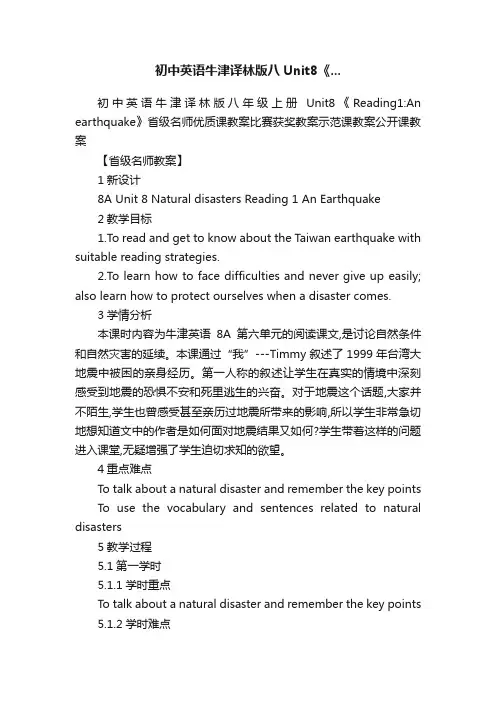
初中英语牛津译林版八Unit8《...初中英语牛津译林版八年级上册Unit8《Reading1:An earthquake》省级名师优质课教案比赛获奖教案示范课教案公开课教案【省级名师教案】1新设计8A Unit 8 Natural disasters Reading 1 An Earthquake2教学目标1.To read and get to know about the Taiwan earthquake with suitable reading strategies.2.To learn how to face difficulties and never give up easily; also learn how to protect ourselves when a disaster comes.3学情分析本课时内容为牛津英语8A第六单元的阅读课文,是讨论自然条件和自然灾害的延续。
本课通过“我”---Timmy叙述了1999年台湾大地震中被困的亲身经历。
第一人称的叙述让学生在真实的情境中深刻感受到地震的恐惧不安和死里逃生的兴奋。
对于地震这个话题,大家并不陌生,学生也曾感受甚至亲历过地震所带来的影响,所以学生非常急切地想知道文中的作者是如何面对地震结果又如何?学生带着这样的问题进入课堂,无疑增强了学生迫切求知的欲望。
4重点难点To talk about a natural disaster and remember the key points To use the vocabulary and sentences related to natural disasters5教学过程5.1第一学时5.1.1学时重点To talk about a natural disaster and remember the key points5.1.2学时难点To use the vocabulary and sentences related to natural disasters5.1.3教学活动活动1【讲授】8A Unit A Natural disasters Reading 1Fast-reading (分段方便学生对课文的进一步学习)T: Now please read the story fast and divide the story into three parts. We can divide it according to three questions that we talked about just now.S: During the earthquake Para1 1-2。
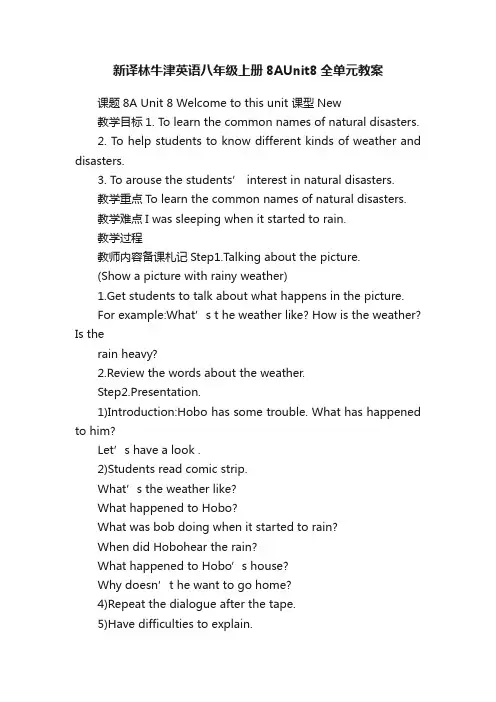
新译林牛津英语八年级上册8AUnit8全单元教案课题8A Unit 8 Welcome to this unit 课型New教学目标1. To learn the common names of natural disasters.2. To help students to know different kinds of weather and disasters.3. To arouse the students’ interest in natural disasters.教学重点To learn the common names of natural disasters.教学难点I was sleeping when it started to rain.教学过程教师内容备课札记Step1.Talking about the picture.(Show a picture with rainy weather)1.Get students to talk about what happens in the picture.For example:What’s t he weather like? How is the weather? Is therain heavy?2.Review the words about the weather.Step2.Presentation.1)Introduction:Hobo has some trouble. What has happened to him?Let’s ha ve a look .2)Students read comic strip.What’s the weather like?What happened to Hobo?What was bob doing when it started to rain?When did Hobohear the rain?What happened to Hobo’s house?Why doesn’t he want to go home?4)Repeat the dialogue after the tape.5)Have difficulties to explain.Be all wet全湿了Mop all the water up用拖把把所有的水拖掉I was sleeping when it started to rain.当开始下雨的时候我正在睡觉。
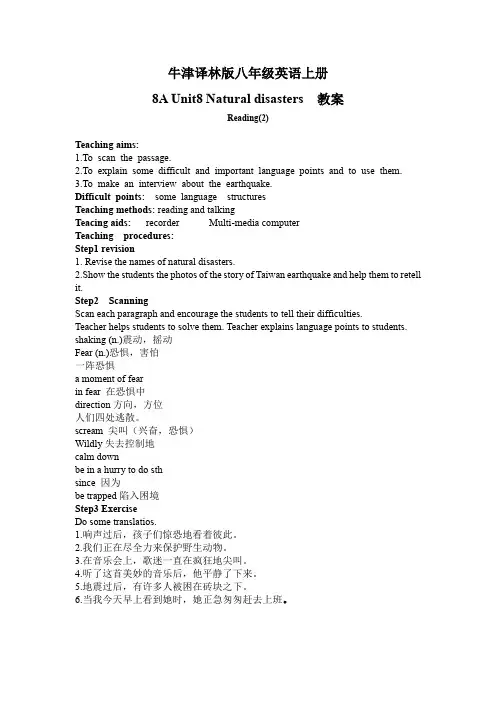
牛津译林版八年级英语上册8A Unit8 Natural disasters 教案Reading(2)Teaching aims:1.To scan the passage.2.To explain some difficult and important language points and to use them.3.To make an interview about the earthquake.Difficult points:some language structuresTeaching methods: reading and talkingTeacing aids:recorder Multi-media computerTeaching procedures:Step1 revision1.Revise the names of natural disasters.2.Show the students the photos of the story of Taiwan earthquake and help them to retell it.Step2 ScanningScan each paragraph and encourage the students to tell their difficulties.Teacher helps students to solve them. Teacher explains language points to students. shaking (n.)震动,摇动Fear (n.)恐惧,害怕一阵恐惧a moment of fearin fear 在恐惧中direction方向,方位人们四处逃散。
scream 尖叫(兴奋,恐惧)Wildly失去控制地calm downbe in a hurry to do sthsince 因为be trapped陷入困境Step3 ExerciseDo some translatios.1.响声过后,孩子们惊恐地看着彼此。
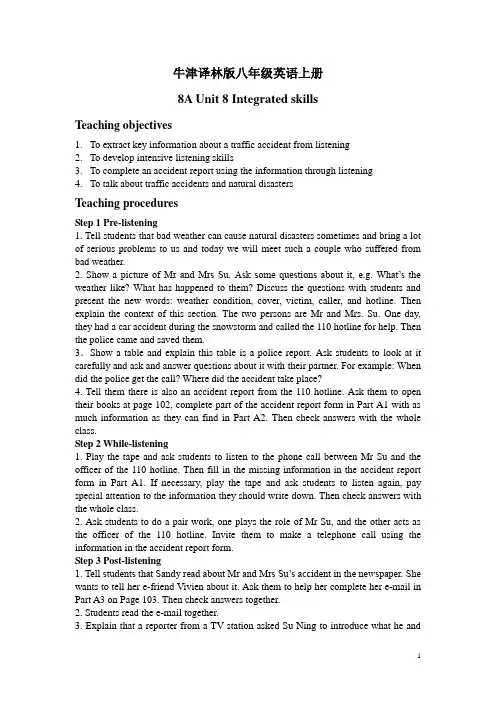
牛津译林版八年级英语上册8A Unit 8 Integrated skillsTeaching objectives1.To extract key information about a traffic accident from listening2.To develop intensive listening skills3.To complete an accident report using the information through listening4.To talk about traffic accidents and natural disastersTeaching proceduresStep 1 Pre-listening1. Tell students that bad weather can cause natural disasters sometimes and bring a lot of serious problems to us and today we will meet such a couple who suffered from bad weather.2. Show a picture of Mr and Mrs Su. Ask some questions about it, e.g. What’s the weather like? What has happened to them? Discuss the questions with students and present the new words: weather condition, cover, victim, caller, and hotline. Then explain the context of this section. The two persons are Mr and Mrs. Su. One day, they had a car accident during the snowstorm and called the 110 hotline for help. Then the police came and saved them.3.Show a table and explain this table is a police report. Ask students to look at it carefully and ask and answer questions about it with their partner. For example: When did the police get the call? Where did the accident take place?4. Tell them there is also an accident report from the 110 hotline. Ask them to open their books at page 102, complete part of the accident report form in Part A1 with as much information as they can find in Part A2. Then check answers with the whole class.Step 2 While-listening1. Play the tape and ask students to listen to the phone call between Mr Su and the officer of the 110 hotline. Then fill in the missing information in the accident report form in Part A1. If necessary, play the tape and ask students to listen again, pay special attention to the information they should write down. Then check answers with the whole class.2. Ask students to do a pair work, one plays the role of Mr Su, and the other acts as the officer of the 110 hotline. Invite them to make a telephone call using the information in the accident report form.Step 3 Post-listening1. Tell students that Sandy read about Mr and Mrs Su’s accident in the newspaper. She wants to tell her e-friend Vivien about it. Ask them to help her complete her e-mail in Part A3 on Page 103. Then check answers together.2. Students read the e-mail together.3. Explain that a reporter from a TV station asked Su Ning to introduce what he andhis wife experienced that day. Tell students: If you are Su Ning, please tell the audien ce about it using the topic ‘My experience during the snowstorm’.Step 4 Speak up1. Say from Mr. Su’s story, we know bad weather can be really dangerous. Sometimes, it can even cause natural disasters. Ask students to listen to a conversation between Sandy and Amy. They are talking about such a natural disaster caused by bad weather.2. Students listen to the tape and answer these questions:No.1 What happened to Vivien’s school last week?No. 2, What caused that disaster?No. 3, Was anybody hurt?3. Students read the conversation in pairs . Then invite some pairs to come forward and role-play it in front of the class.4. Ask students if they have heard about the Taiwan earthquake in 1999. Go through some details about that earthquake with the class.5. Ask students to tell their friend about that disaster. They ca n use Sandy and Amy’s conversation as a model and replace the underlined words with their own ideas.6. Students can talk about any other natural disasters they have experienced or heard about with their partner.。
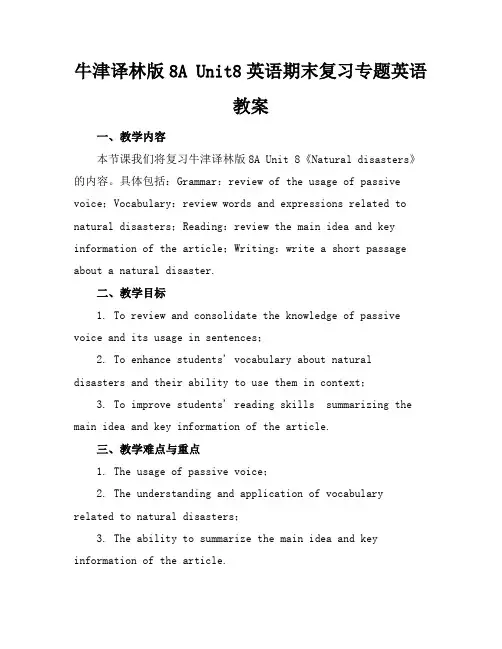
牛津译林版8A Unit8英语期末复习专题英语教案一、教学内容本节课我们将复习牛津译林版8A Unit 8《Natural disasters》的内容。
具体包括:Grammar:review of the usage of passive voice;Vocabulary:review words and expressions related to natural disasters;Reading:review the main idea and key information of the article;Writing:write a short passage about a natural disaster.二、教学目标1. To review and consolidate the knowledge of passive voice and its usage in sentences;2. To enhance students' vocabulary about natural disasters and their ability to use them in context;3. To improve students' reading skills summarizing the main idea and key information of the article.三、教学难点与重点1. The usage of passive voice;2. The understanding and application of vocabulary related to natural disasters;3. The ability to summarize the main idea and key information of the article.四、教具与学具准备1. Blackboard;2. Multimedia projector;3. Handouts with exercises;4. Answer sheets for selfchecking.五、教学过程1. Leadin:Show pictures of different natural disasters and ask students to name them, then elicit the topic of the unit.2. Review of passive voice:Present several sentences about natural disasters and ask students to change them into passive voice. Discuss the usage and rules of passive voice.3. Vocabulary review:Ask students to match the words and expressions related to natural disasters with their definitions. Then have a brainstorming session to see how many words they can recall.4. Reading review:Divide students into groups and ask them to summarize the main idea and key information of the article. Share their answers and discuss as a class.5. Writing practice:Ask students to write a short passage about a natural disaster they have experienced or learned about. Provide them with guiding questions to help structure their writing.6. Oral practice:Pair students up and ask them to discuss the causes and effects of natural disasters. Encourage them to use the vocabulary they have reviewed.六、板书设计1. Passive voice:Rules and examples;2. Vocabulary:List of words and expressions related to natural disasters;3. Main idea and key information of the article.七、作业设计1. Write a short passage about a natural disaster using passive voice;2. Translate the following sentences into English using the vocabulary learned:洪水造成了严重的损失。
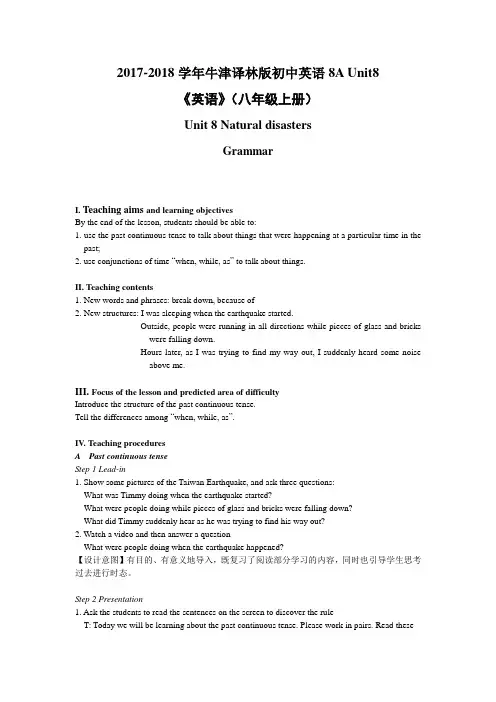
2017-2018学年牛津译林版初中英语8A Unit8《英语》(八年级上册)Unit 8 Natural disastersGrammarI. Teaching aims and learning objectivesBy the end of the lesson, students should be able to:1. use the past continuous tense to talk about things that were happening at a particular time in the past;2. use conjunctions of time “when, while, as” to talk about things.II. Teaching contents1. New words and phrases: break down, because of2. New structures: I was sleeping when the earthquake started.Outside, people were running in all directions while pieces of glass and brickswere falling down.Hours later, as I was trying to find my way out, I suddenly heard some noiseabove me.III. Focus of the lesson and predicted area of difficultyIntroduce the structure of the past continuous tense.Tell the differences among “when, while, as”.IV. Teaching proceduresA Past continuous tenseStep 1 Lead-in1. Show some pictures of the Taiwan Earthquake, and ask three questions:What was Timmy doing when the earthquake started?What were people doing while pieces of glass and bricks were falling down?What did Timmy suddenly hear as he was trying to find his way out?2. Watch a video and then answer a questionWhat were people doing when the earthquake happened?【设计意图】有目的、有意义地导入,既复习了阅读部分学习的内容,同时也引导学生思考过去进行时态。
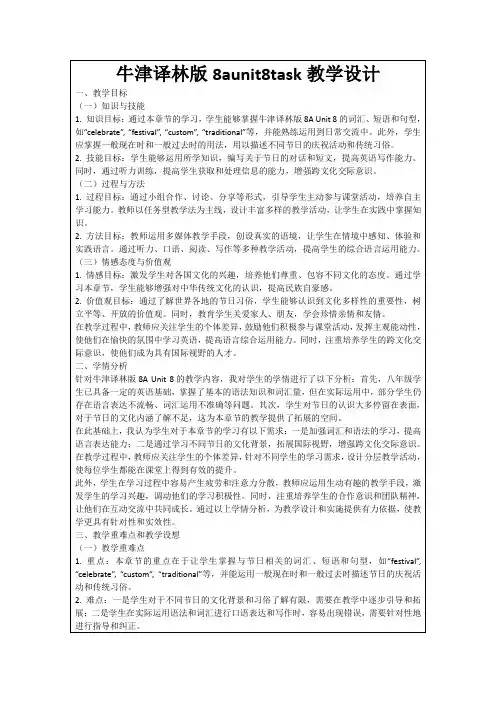
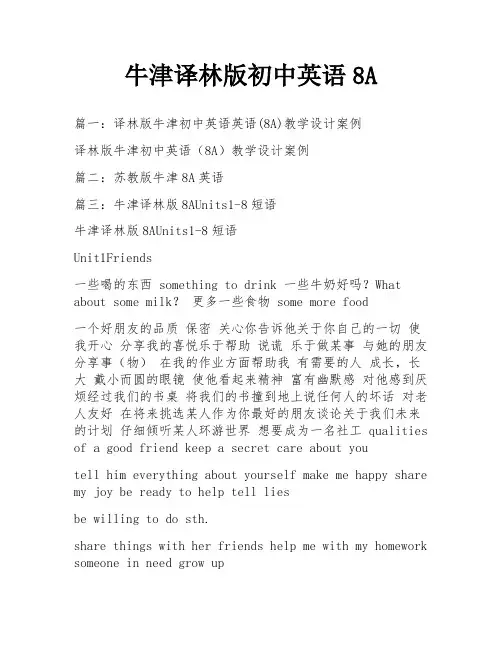
牛津译林版初中英语8A篇一:译林版牛津初中英语英语(8A)教学设计案例译林版牛津初中英语(8A)教学设计案例篇二:苏教版牛津8A英语篇三:牛津译林版8AUnits1-8短语牛津译林版8AUnits1-8短语Unit1Friends一些喝的东西 something to drink 一些牛奶好吗?What about some milk?更多一些食物 some more food一个好朋友的品质保密关心你告诉他关于你自己的一切使我开心分享我的喜悦乐于帮助说谎乐于做某事与她的朋友分享事(物)在我的作业方面帮助我有需要的人成长,长大戴小而圆的眼镜使他看起来精神富有幽默感对他感到厌烦经过我们的书桌将我们的书撞到地上说任何人的坏话对老人友好在将来挑选某人作为你最好的朋友谈论关于我们未来的计划仔细倾听某人环游世界想要成为一名社工 qualities of a good friend keep a secret care about youtell him everything about yourself make me happy share my joy be ready to help tell liesbe willing to do sth.share things with her friends help me with my homework someone in need grow upwear small and round glasses make him look smarthave a good sense of humour feel bored with him walk past our desksknock our books onto the floor say a bad word about anyone be kind to old people in the futurechoose sb. as your best friend talk about our future plans listen to sb. carefully travel around the world would like to be a social worker学习更多关于。
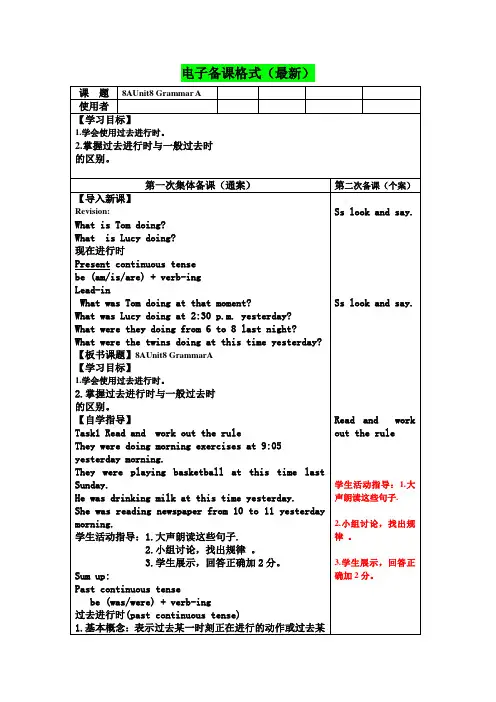
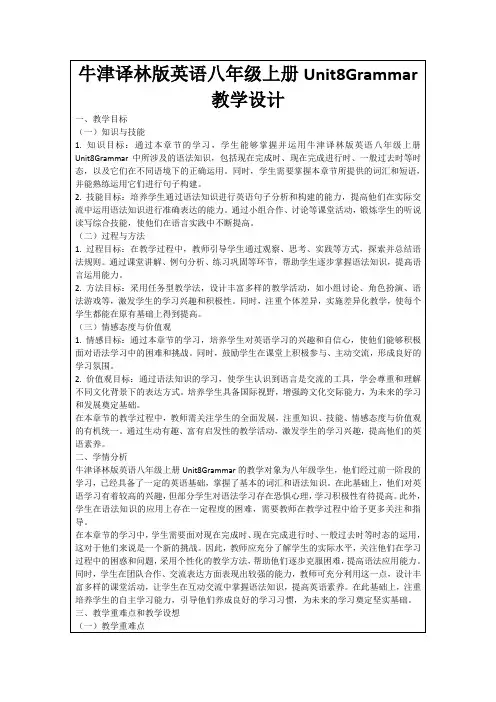
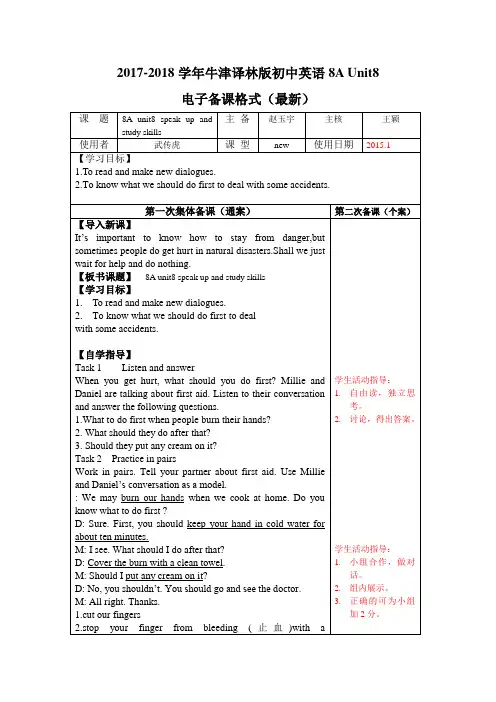
牛津译林版8A Unit8英语期末复习专题英语精品教案一、教学内容本节课我们将复习牛津译林版8A Unit 8《Fashion》这一章节内容。
具体包括:Reading部分时尚品牌介绍,Grammar部分过去进行时,Task部分时装设计,以及Supplementary reading部分时尚潮流。
二、教学目标1. 让学生掌握与时尚相关词汇和表达方式。
2. 巩固过去进行时用法,并能在实际情境中灵活运用。
3. 培养学生审美观和创造力,通过设计时装展示出来。
三、教学难点与重点1. 教学难点:过去进行时用法,时尚词汇掌握。
2. 教学重点:运用过去进行时描述正在进行事情,以及时尚相关词汇运用。
四、教具与学具准备1. 教具:PPT、黑板、时装设计素材。
2. 学具:课本、练习本、彩色笔。
五、教学过程1. 实践情景引入(5分钟)利用PPT展示时尚品牌和时装周图片,引导学生谈论自己对时尚理解和看法。
2. 例题讲解(10分钟)以Reading部分时尚品牌为例,讲解过去进行时用法,并让学生模仿造句。
3. 随堂练习(10分钟)让学生结合Grammar部分练习,运用过去进行时描述图片中场景。
4. 课堂互动(15分钟)分组讨论Task部分时装设计,每组选择一个主题,用英文描述设计理念和过程。
5. 展示与评价(10分钟)各组展示自己时装设计,其他同学用英文进行评价。
6. 课堂小结(5分钟)七、作业设计1. 作业题目:以Supplementary reading部分时尚潮流为素材,写一篇关于自己喜欢一种时尚潮流英文短文。
2. 答案:略。
八、课后反思及拓展延伸1. 课后反思:通过本节课学习,学生对过去进行时掌握程度如何?对时尚相关词汇运用是否熟练?2. 拓展延伸:鼓励学生在课后关注时尚资讯,解不同时尚潮流英文表达,为下一节课分享做好准备。
重点和难点解析在教学过程中,有几个细节是我需要重点关注。
是教学内容选择与组织,是教学难点和重点把握,接着是教学过程合理安排,以及作业设计针对性和课后反思深度。
Unit 8 Natural disastersComic strip & welcome to the unitTeaching aims1.to introduce the topic “Natural disasters”.2.To identify vocabulary related to the topic.Teaching content1.learn some new words: natural, accident, wash, village, lightening, storm, rainstorm, thunder, etc.2.Learn some phrases: mop up , lose the final, wash away, catch fire, start fire.3.Sentences:I was sleeping when it started to rain.Didn’t you hear the rain?Who’s going to mop up the water if I go home without you?Was anyone hurt?Difficulties and key points1.to grasp the new words of natural disasters.2.To distinguish the natural disasters from accidents.Teaching aidssome pictures , a tape-recorder &multimediaTeaching proceduresStep1 :Lead-inBefore this lesson, the teacher can collect some pictures about some natural disasters.In class, the teacher show these pictures to the students, and ask them, “ What can you see in the picture?”, “What happened to these things/people?”Step 2: Presentation1.Revise the change between adjectives and adverbs.2.Ask students: What is the weather like today? What ‘re the disasters? What are natural disasters?Step 3: Practice1.Look at the pictures of the dialogue. Guess what’s wrong with Hobo?2.Play the recording, listen and answer the following questions:⑴What’s wrong with Hobo?⑵Why does Hobo ask Eddie to go home with him?3.Ask several pairs to practise the dialogue.4.Notes:(1)Didn’t you ...?(2)... if ...(3)一段时间+ laterAfter + 一段时间Step 4: Learning1.Guessing games:The teacher describes some kinds of disasters and get students to guess what they are .2.Practice reading the new words and phrases.3.Get students to complete Part A.4.Notes:(1)Accident 可数名词;an accident 不可数名词:by accident(2)Thousands of (不确定数) two thousand (确定数)Step 5: Free talk1.Get students to listen to the record of the conversation and practice reading it.2.Get students to talk about some natural disasters in their life freely.Step Homework1.Memorize the words of natural disasters.2.Talk about more disasters.Unit 8 Natural disastersReadingTeaching aims1.To infer meaning from keywords and context.2.To grasp the language points in the context.3.To develop the students’ ability of reading and using English.4.To make students learn more about the damage caused by the earthquake.Teaching contentWords: shaking , body, fear, scream, shake, direction, glass, brick, calm, moment, mind, since, alive, loudly,etc. Phrases: at first ,in fear, run out of, in all directions, fall down, come down, be trapped, go through, calm down, shout for help, pull through, find one’s way, move away, etc.Sentences:I was sleeping when the earthquake started.... people were running in all directions while pieces of glass and bricks were falling down.... I told myself to calm down since I was still alive.... I did not know if anyone else was near me.... there was just just enough space for me to move.Difficulties and key points1.To grasp the language points in the text.2.To finish the exercises about the reading comprehension.3.To recite the whole text.4.To understand the object clause.Teaching aidsmultimedia, a tape-recorder, some wall chartsTeaching proceduresStep1 :Lead-inMethod 1: Show some pictures about. Wenchuan earthquakes to students, make them remember the situation in 12 th May. Think about the power of earthquake.Method 2: Ask two pairs of students to perform the dialogue of last lesson. Show pictures about earthquake to the students and ask them to say something about the pictures.Step 2: Presentation1.Show some pictures or videos about Wenchuan earthquake.2.We all remember the Wenchuan earthquake, but we know little about the Taiwan earthquake. There was a survivor in the Taiwan earthquake,we want to know what happened to Timmy.Step 3 : Leading1.Listen to the passage, answer the following questions:(1)Where are Timmy?(2)What happened to the people and buildings?(3)Where was Timmy when the shaking stopped?(4)What did Timmy do while he was waiting for help?(5)How was Timmy saved?2.Check out the answers. Then play the recording for the students to listen to.3.Write some keywords on the blackboard, then play the recording again, the students just listen without books and look at the keywords to understand the passage.Step 4: Activities1.Do the exercises in B1 and B2 on page 95.2.Play the recording again, let the students listen and repeat.3.Read the passage, then do exercises in B3 and B4 on page 96.Step 5 : Explanation1.shake v. --- shaking n.2.slight adj. --- slightly adv.3.In all directions4.try one’s best to do sth.5.finally = at last = in the end6.calm v. & adj.7.If 引导的宾语从句8.I did not even know where I was.9.say to oneself10.alive adj. 作后置定语与表语Step 6 : Practice1.Finish the rest of the exercises.2.Read the passage one by one.3.Retell the passage with keywords.Step 7 : Homework1.Recite the whole passage.2.Remember the language points.Unit 8 Natural disastersGrammarTeaching aims1.To understand the basic structures of past continuous tense.2.To master the past continuous tense.3.To use the past continuous tense with “when ”, “as” and “while” correctly. Teaching contentWords: terrible, break, snowball, snowman, hitPhrases: break down, because of , come into, fall over, run towards Sentences:I was sleeping. They were not sleeping. Were you sleeping?I saw you and your parents standing on the side of the road.He was ringing someone to come and help when Millie saw us.As I was trying to find my way out, I suddenly heard some noise above me.While Millie was watching TV. Andy came into the room.Difficulties and key points1.To use the past continuous tense correctly.2.To master the differences between “when” and “while”.Teaching aidsmultimedia,some pictures and cardsTeaching proceduresStep1 :Lead-inMethod 1: T: What are you doing?S: We are having at English class.T: What were you doing at this time yesterday?S: We were having a Geography class.Method 2: T: After learning a passage about earthquakes, are you interested in it? Students in Class 1 Grade 8 are trying to find more about earthquakes. Let’s see what they did yesterday.Step 2: Presentation1.Ask students some questions ,create plots and scenes to use past continuous tense.2.Help students understand that the past continuous tense is used to talk about things that were happening some time in the past .3.Write the basic structure on the blackboard: “was / were (not) + v. -ing”.4.Give examples of changing the sentences into negative sentences, and how to ask and answer questions using the past continuous tense.Step 3 : Activities1.Finish the exercise in Part A. Then check the answers.Notes:(1)look for/ find(2)See sb. Doing sth./do sth.(3)It’s time to do sth./ for sth.2.Ask some students to make sentences with the past continuous tense.Step 4: Presentation1.Ask some questions about the dialogue in Part A. write the answers on the blackboard. Underline the word “when” and “while”.E.g. T: What was Millie doing when the snowstorm came?Millie was walking to the bus stop when the snowstorm came.Show more sentences like this on the blackboard.2.Help students to work out the rule. When we talk about a longer action, we usually use “while”. or “as”.Step 5 : Activities1.Finish the exercises in Part B. then check the answers.2.Make sentences using “when” and “while”.e.g.(1) While my mother was cooking supper, my father was reading newspapers.(2) When I came home, my little dog was sleeping.(3) The students were talking when the teacher came in.(4) My sister was listening to the music while my brother was watching TV.Step 6 : HomeworkUnit 8 Natural disastersIntegrated skillsTeaching aims1.To listen to the recording and make some notes according to different “natural disasters”.2.To complete the dialogue about different disasters according to the recording.3.To talk about dealing with different accidents.Teaching contentWords: danger, situation, burn, follow , safety, should, moreover, pancakes, dangerous,etc.Phrases: away from, cover with, as....as possible, protect ... from... be on fire, take a lift, traffic accident, stay away from, keep one’s hand in cold water, put on etc.Sentences:Look carefully, right and left when you cross the road.Do you know what to do first if I burn myself?Difficulties and key pointsTo get the correct information from the listening materials.Teaching aidscharts, a tape-recorder and multimediaTeaching proceduresStep1 :Lead-inT: Good morning, everyone! Today we’ll do some listening exercises. It’s about “protecting yourself from danger”. what should you do when you are in danger? Firstly, let’s revise some knowledge about “natural disasters”.Step 2: Presentation1.Ask students to look through the exercise in Part A1 before they listen.2.Play the recording for the students to listen and write down the correct telephone numbers.Step 3 : Listening and practicing1.Help students go through the notes in Part A2, tell them what they should do.2.Play the recording for students to listen and complete the notes.3.Check their answers.Step 4:Listen againLet students listen to the tap again and finish Part A3. Then check the answers and explain some language points.Eg: moreover, be on fireIt’s dangerous to use lifts during points.Step 5 : Activities1.Ask : What should you do when you face an accident? Get some students to tell the whole class what they should do.2.Play the tape for the students to listen to .Ask : What is the accident?How should Millie deal with the burn?3.Divide students into groups and practise the dialogue using their own information.4.Encourage some pairs to act out their dialogues in front of the whole classStep 7 : Homework1.Go over the language points in this part.2.Practice more dialogues about “ Protecting yourself from danger”.Unit 8 Natural disastersStudy skillsTeaching aims1.To learn how to form the compound words.2.To divide the compound into two parts correctly.Teaching content1.To master the rules of forming the compound.2.Words: create, pancake, relationship, separate, headachePhrases: put... together, compound words, separate intoSentences: We can put two words together to create new words.Sometimes we can remember words more easily by separating some compound words into two words. Difficulties and key pointsTo learn to form the compounds and divide them into parts correctly.Teaching aidssome cards and multimediaTeaching proceduresStep1 :Lead-inT: Today, we are going to learn a new kind of forming words. Now look at the cards.The teacher puts two cards with words that have been learnt, and ask:Can you know the new words?S: Yes, classroom, classmate, earthquake, etc.Help students summarize the rules of forming the new words.Step 2: Presentation1.Write down these words on the blackboard.2.Get students to read through these words and guess their meanings.Step 3 : Discussion1.Divide the whole class into several groups and discuss the rules of forming new nouns.2.Ask students to think out more compound words.3.Get some students from each group to present their results to the whole class, the teacher help them summarize the rules.4.Get students to write the correct words in the blanks in Part A according to the word-building rules.Step 5 : PracticeGive students some minutes to divide these words into two parts. Then check their work.Step 6 : BrainstormingGive students to think about this kind of word-formation, then tell more words about it.E.g: football, notebook, waiting-room, etc.Step 7 : Homework1.Revise this kind of word formation.Find out more words like these.Unit 8 Natural disastersTaskTeaching aims1.To generate ideas about natural disasters.2.To organize ideas using Sandy’s notes.3.To organize ideas for writing an article about a natural disaster for the school newsletter.Teaching content1.To learn to organize ideas about the article “natural disasters” according to Sandy’s notes.2.To complete Sandy’s article and use the article as a model to write a short article.3.Words: hit ,share, terrible, nearly, sweep, umbrella.Phrases: share with, sweep away, pull through, fall over, look out ofSentences: We could only hear the wind blowing.The snow kept falling around us.I share an umbrella with her while we were walking to the bus stop.Difficulties and key pointsTo writ an article about “natural disasters”.Teaching aidsPictures, a tape-recorder&multimediaTeaching proceduresStep1 :Lead-in1.Show some pictures about different “natural disasters” and let students talk about them in pairs.2.Play a short video about an earthquake and get students to answer some questions.Step 2: Presentation1.T: Good morning /afternoon / evening, everyone! Today we will hear a story about a snowstorm. Do you want to know what has happened? Let’s go and see.2.Ask some students to read the notes one by one on page 102.Step 3 : Leading1.Explain the notes in Part to students.2.Tell students the notes can be divided into three parts; the introduction, the things happened during below the snowstorm and after the snowstorm.3.Let students discuss the form of writing notes.e the words and sentences below the notes on page 102 to talk about different “natural disaster ”Step 4: Activities1.Read through the passage on page103 and help students understand the whole passage.plete the passage using the information in Part A.3.Ask two students to read the passage.Notes:(1)hit → hit(过去式)→ hit(过去分词)(2)share sth. with sb.(3)keep doing sth.(4)fall over(5)look out ofStep 5 : Explanation1.Divide students into several groups to talk about a natural disaster.anize the ideas using the useful expressions in Part A.3.Ask some students to read their notes in front of the whole class.Step 6 : Practice1.Get students to write an article about a natural disaster on their own.2.Show their works to the whole class.Step 7 : Homework1.Revise the language points in this unit.2.Do some exercises of this unit.。
牛津译林版八年级英语上册8A Unit8 Natural Disasters Integrated SkillsTeaching Objectives:To learn some useful expressions in case of the emergency call.To train the ability of getting details from the tape and use the information to finish the report form. To retell the accident with the information on the accident report call.Teaching contents:Words: condition cover caller arrival serious victim mobile phone Phrases: weather conditions cover the whole roadTime of arrival get worseCrash into catch fireSend the victim to…Sentences: She is as slim as I am.She is also helpful and is ready to help people any time.Betty wants to be a singer and travel around the world when she grows up.He has poor eyesight because of working on the computer too much at night.His legs are very long and they do not fit under the school desks.She is kind and never says a bad word about anyone.Teaching preparations:ComputerPicturesTape recorderTeaching procedures:Step 1 Warm-upT: What’s the weather like today? How can I know the weather a day earlier? (report)T: Through the weather report we can know the weather conditions. How many kinds of weather do you know? (windy, cloudy, sunny, rainy, snowy) And which do you think is the most interesting one? Why ?Show them the picture and say: The snow covers all the things and we can play with our friends. But if there is too much snow, it will be a disaster, and there will be some accidents on the road.Step 2 PresentationShow a picture about a car accident to the students.T: What can you see in the picture? (crash into). If there are some people in the car, they may hurt. So we call them “victims”. And we have to send them to the hospital, we can call what number? Teach the students some useful phone numbers.Present a picture.T: what information can you get from the picture? (a snowstorm, crash into a tree, trapped in the car, 2 people)T: they are Mr Su and Mrs Su, look at part A2 and fill in the blanks as many as you can. Then listen to the tape and try to complete the accident report form.Step 3 Practice1: listen to the tape and fill in the blanks. Play the tape again and then check the answers.2.listen for the third time and solve some problems that the students have.3.T: suppose that you are an reporter and now you are interviewing the couple, work with yourpartner and try to make a dialogue. Here are some questions:What happened to you, Mr Su?Were you alone in the car?Why didn’t you get out by yourself?Was anyone hurt?Did you call someone for help?What do you think caused the accident?4.Finish part A3. check the answers.5.retell the accident according to some hints.Step 4 Presentation1. T:Sandy told her e-friend about the snowstorm in her e-mail. Vivien also told her about a natural disaster in her school. Let’s listen to the conversation and find out what disaster it was.2. Play the tape and try to answer these questions:What happened in Britain?What caused the fire?Was anyone hurt?1.read after the tape and let the students themselves make up some dialogues using this as a model.Step 5 Homework。
牛津译林版8A Unit8英语期末复习专题英语优质教案一、教学内容本节课我们将复习牛津译林版8A Unit 8《Fashion》这一单元。
具体内容包括:Grammar部分,一般过去时和现在完成时运用;Reading部分,理解并分析课文《Fashion show》中时尚元素;Vocabulary部分,学习并掌握与时尚相关词汇和表达方式。
二、教学目标1. 让学生掌握一般过去时和现在完成时用法,并能在实际语境中灵活运用。
2. 培养学生阅读理解能力,能分析课文中时尚元素。
3. 扩充学生词汇量,掌握与时尚相关词汇和表达方式。
三、教学难点与重点1. 教学难点:一般过去时和现在完成时区别与运用。
2. 教学重点:阅读理解能力培养和时尚相关词汇掌握。
四、教具与学具准备1. 教具:PPT、黑板、粉笔、教学光盘。
2. 学具:课本、练习册、字典、笔记本。
五、教学过程1. 导入:通过播放一段时尚秀视频,引起学生对时尚话题兴趣,进而导入本节课学习内容。
2. 语法讲解:讲解一般过去时和现在完成时区别与运用。
过程细节:通过例句、图表等形式进行讲解,让学生在实际语境中感受两种时态用法。
3. 阅读分析:分析课文《Fashion show》中时尚元素。
过程细节:引导学生从文中提取关键信息,分析时尚元素,并进行课堂讨论。
4. 词汇学习:学习与时尚相关词汇和表达方式。
过程细节:通过PPT展示,让学生跟读、模仿,并进行小组活动,巩固所学词汇。
5. 随堂练习:设计相关语法、阅读和词汇练习,检验学生学习效果。
过程细节:学生独立完成练习,教师对答案进行讲解,并对学生疑问进行解答。
六、板书设计1. 语法部分:板书一般过去时和现在完成时区别与例句。
2. 阅读部分:板书课文中关键信息和时尚元素。
3. 词汇部分:板书与时尚相关词汇和表达方式。
七、作业设计1. 作业题目:(1)用一般过去时和现在完成时各写一段话,描述自己一次购物经历。
(2)根据课文《Fashion show》,列举出你认为最有特色三个时尚元素,并简要说明原因。